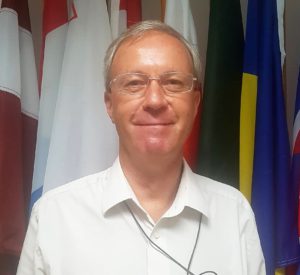
Message from the European Union

EU WELCOMING REMARKS
PacWastePlus Steering Committee Meeting
12 May 2022
Mr Michal Krejza, Head of Cooperation, Delegation of the European Union for the Pacific
Ladies and Gentlemen,
Dear colleagues,
I would like to warmly welcome everyone to the 2022 PacWaste Plus Steering Committee meeting; those of you who are participating here in Suva in person, as well as many of you connected online. Firstly, let me acknowledge some of the participants:
- Toeolesulusulu Cedric Schuster, Minister of Natural Resources and Environment of Samoa, thank you for your opening remarks;
- Mr Sefanaia Nawadra, whom I congratulate for his appointment as the new Director General of SPREP and I look forward to our future cooperation;
- Ms Christina Fillmed, Director of the Yap State Environmental Protection Agency from the Federated States of Micronesia, who will be chairing today’s meeting;
- Colleagues from the PacWaste Plus programme management unit, who organised this meeting for us;
- the country focal points;
- and last but not least the PacWaste Plus implementing partners USP and SPC.
The PacWastePlus programme started in 2018 and is thus in its 4th year of implementation. As you have noticed, the title of today’s meeting is “Implementation and Commitments”. It reflects the fact that we have long passed the planning phase of the programme and it is time to step up the implementation on the ground.
The past two years have certainly been very challenging, but we have managed to move forward and make important steps in the right direction despite the travel restrictions in the region. In this regard, I would like to acknowledge and welcome the work being done in terms of the preparation of country projects.
All country-specific projects are now agreed upon between SPREP and the participating countries, with the exception of two projects that are still awaiting formal approval and signature. I encourage the two remaining countries to agree and proceed with the approval of their projects swiftly, in order not to lose the allocation for their country projects. Let us not forget that the programme only has two more years of implementation left, so we should not lose any more time.
The PacWastePlus programme reflects the importance of the EU’s partnership with the Pacific in preserving the environment and supporting the countries in the area of sustainable management of waste.
These priorities are also included in the European Union Programming for the Pacific for the years 2021-2027. They are in line with the EU-Pacific Green-Blue Alliance, which we launched at the COP26 meeting in Glasgow last year.
In 2021, the PacWaste Plus programme supported the organisation of the 3rd Clean Pacific Roundtable, an important event which took stock of the progress made under the Cleaner Pacific Implementation Plan 2016–2019 and where the new Cleaner Pacific 2025 Implementation Plan was adopted. This Plan establishes the high-priority waste management and pollution control activities for the Pacific region, and I am happy to see that the PacWaste Plus programme will provide support to many of these activities during the next two years.
The Clean Pacific Roundtable also included a session on Circular Economy in the Pacific. While this may still be a rather new concept for the region, the PacWaste Plus programme is already supporting actions that are in line with the circular economy principles.
For all the components of the PacWastePlus regional programme it is now time to step up the implementation efforts and show the real results of the programme without further delays. I am confident that with your full commitment, we will be able to deliver concrete outcomes.
I look forward to the Talanoa sessions of today’s meeting and encourage all the participants, especially the country focal points, to engage and openly discuss any issues you may be facing in addressing sustainable waste management in your country, in order to identify the appropriate solutions.
Finally, I am confident that with your collaboration and engagement we can make substantial changes in the management of waste in this region, one small step at a time, towards long-term sustainable solutions. In particular, we need to look for solutions that do not consider waste purely as an expensive problem to solve, but rather as a source of revenue through export and recycling, through waste levies or other sustainable financing mechanisms.
I look forward to a successful meeting today and I encourage all the participants to actively participate in today’s discussions.
